The following, which I find hilarious, is taken from Oh Noes!:
"It's fucking La Grange. Not LaGRANGE. What the fuck kind of spelling is that? In what language/regional vernacular/country do you combine what is clearly two french words into one, with the second transformed into all caps? What does that signify? Is the Grange really angry, hence BEING USED IN ALL CAPITAL LETTERS AS IF IT IS YELLING IN AN ONLINE CONVERSATION? Why stop there? Why not name it XxLaXGrAnG3xX or La_Gran928374 or Fuckertown, because every time I see the name of my favorite County Seat butchered like that, a little part of me dies. Nobody in the City Government knows either. That's why you'll see "La Grange" (Correct), "LaGrange" (Incorrect), and "LaGRANGE" (Jesus how more incorrect can you be?) used interchangably throughout our buildings, maps, business cards...you name it, we've fucked it up."
See? I'm not the only one who gets annoyed by this stuff.
Technorati just amazes me.
Thursday, September 29, 2005
Tuesday, September 27, 2005
Encore Pépé!
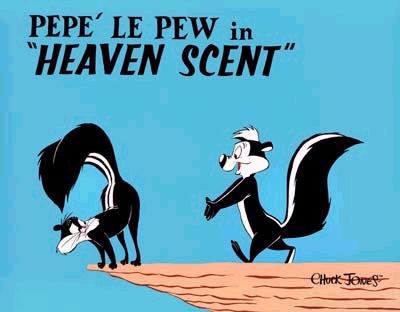
When I posted a while back about Pepe Le Pew and how his character would fare should he lose his accent, Neil commented that Pepe was probably most Americans' first exposure to "the French"(That is, if Pepe Le Pew could be called "French"). I would tend to agree with that thought, especially since it probably applies to me--I can't recall being exposed to anything French-related by my parents...the closest I would have come would have been watching Looney Tunes with my dad on a regular basis.
I must admit that most of the jokes in those cartoons went straight over my 7-year-old head. I remember not understanding what was so funny about hearing Penelope say "Le pant! Le puff!" as she inched up a cliff in her efforts to escape her amorous polecat. I also didn't get why every human character had an enormous nose and teeny-weeny mustache, or why it was funny that a smelly skunk should happen to be cast as a Frenchman. (Tangent: Note the ill-placed accent mark in the above image--more on this in a future post.)
Of course, these jokes don't pass me by anymore. There was a time (before I lightened the hell up) when I would have been offended by things like that, but after having been through 10 years of hearing every anti-French joke known to man, with a whopping five of those years being subject to the petitesse of the Republican Party, I realize that there are far worse things I could be hearing or seeing with regard to this subject.
Pepe Le Pew is actually one of my favorite pieces of Frenchie trivia. The character was based on an actual French actor, Jean Gabin, who was basically the French William Holden or Clark Gable. Gabin starred in a little movie called Pépé le Moko (1937), which, as fate would have it, I ended up watching more times than I'd ever want to count for three different college film classes.
The movie, which was later pointlessly remade by Hollywood as Algiers (1938), follows Gabin as Pépé, a debonair Frenchman hiding out from the cops in the casbah of Algiers. While dodging the heat, he makes perfectly clear the fact that he has wooed every woman in the casbah, and then some. This smooth-talking, debonair character was the inspiration for Pepe Le Pew. If you ever have occasion to watch Pépé le Moko, you'll see the resemblance immediately. There is no lack of shots of Pépé with those heavily lidded, angelicly lashed eyes gazing down upon the dame quickly melting in his arms. I do have to admit that I can't help but swoon at least a little when he looks at the camera with his hair messed up. It just makes him look so dashing...
Shall we compare headshots and film stills?
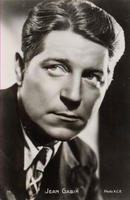

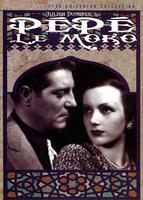
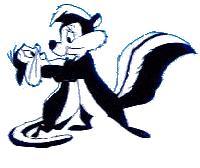
Needless to say, I find Pepe Le Pew endearing--the same way I find it endearing to have people buy me frogs to add to my growing collection. Oddly enough, in the French version, Pépé le putois, Pepe is Italian and all the malapropisms characteristic of the cartoons are redone accordingly. This makes me wonder about the Italian version--what nationality did they find that is more amorous than the Italians?? (Maybe the Brazilians, Sangroncito?)
Sunday, September 25, 2005
Laissez les bons temps rouler toujours!
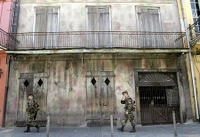 I realize that I'm late in weighing in on the destruction caused by Hurricane Katrina; I guess I didn't want to be a part of the glut that normally happens right after an event of this nature. I was watching The Waterboy today, and I couldn't help but think about my lack of posting on the topic. I am especially saddened by the catastrophe because New Orleans is one of the places I've been wanting to visit ever since high school, when my math teacher would tell us stories about what it was like to grow up there.
I realize that I'm late in weighing in on the destruction caused by Hurricane Katrina; I guess I didn't want to be a part of the glut that normally happens right after an event of this nature. I was watching The Waterboy today, and I couldn't help but think about my lack of posting on the topic. I am especially saddened by the catastrophe because New Orleans is one of the places I've been wanting to visit ever since high school, when my math teacher would tell us stories about what it was like to grow up there.I never really had a desire to participate in the debauchery of Mardi Gras, but I would love to hear some zydeco and, most of all, try my tongue at a little Cajun French. I think Louisiana would be a goldmine for this blog--an entire state full of French names (both place names and family names), just waiting for a good old-fashioned American butchering. Just the capital city itself is a good start:

New Or-LEENS
New OR-lins
N'awlins
NWAR-lins
(you get the idea.)
La Nouvelle République, the Loire Valley's main daily, had pictures of the destruction on its front pages for weeks. I phoned one of my friends in France and we talked at length about the horrible events. She happened to have been here in Pittsburgh a year ago when half of our town flooded due to weather caused by Hurricane Ivan, and I remember her saying that she'd never experienced such destructive weather before.
The Loire Valley itself floods every year as part of the vagaries of the river's flow; in December and January the engorged river takes over groves of trees, childrens' play areas, and castle grounds. But this temporary, annual inondation is nothing compared to the destructive nature of hurricane weather. I suppose that's one advantage to being bordered by a sheltered body of water such as the Mediterranean Sea.
I hope that the nation is able to help New Orleans rebuild; it is such a rich part of our country's heritage and a reminder of our historical connection with France. I hope that strains of music and laughter are heard again soon in the streets of the French Quarter.
Laissez les bons temps rouler toujours!
Photos: Preservation Hall, French Quarter, New Orleans (post-flooding).
Flooded grounds of Azay-le-Rideau, a château which sits on an island in the Indre River (a tributary of the Loire).
Thursday, September 15, 2005
The Clé to My Heart
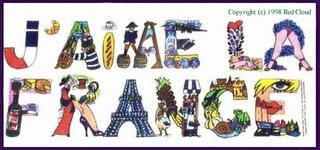
It's difficult when your significant other does not share the same passions in life as you do. Not only does my fiancé not speak French, but he used to be one of those kids in high school who were the bane of my existence: he was a high-school French class cut-up.
Never in my wildest dreams did I ever think I'd end up with someone like him. People like him annoyed and teased the hell out of me back when I was 15. I guess the fact that I met him out of this context (in the college dorm rather than the high school hallway) explains how I was able to stand him long enough to find myself ready to meet him at the end of the aisle several years later.
The fact that my fiancé does not share my francophilic enthusiasm does not dampen my spirits that much; French has always been a solo passion for me. My entire family speaks either Italian or Spanish as a second language and my decision to study French was done partially because of some innate interest in the culture and partially because it seemed rebellious and forbidden. After all, my Italian grandmother did tell me it was "a sin not to study Italian!". So, sin I did. And I liked it; I loved it. I still do. It just meant a lot more solo outings to movies, operas, gallery openings and even solo travel. I have to say that solo travel is sometimes more interesting than travel in pairs or in groups. (I will save some of my anecdotes on this subject for future posts.)
Every now and then, my fiancé will ask me who I love more, him or the French. He asks it playfully, knowing he won't get a straight answer out of me. I can't choose between the two--the pros and cons even each other out. I guess I could say I love him more, safe in the knowledge that nothing, except maybe mental disease, can take my French away from me. It's sort of like family in that sense-it'll always be there at the end of everything. Let's face it: if I were in the classic "lifeboat" situation, I wouldn't have to make a choice between my fiancé or my French. I could save them both!
Friday, September 09, 2005
5-and-10 Linguistics
 A bit of wit and wisdom from that maverick of useless information, Cecil Adams:
A bit of wit and wisdom from that maverick of useless information, Cecil Adams:Dear Cecil:
Don't know whether Baltimore ever had a Bijou movie theater. Don't know if there are too many around the country now. But at one time wasn't Bijou a very popular name for a movie house? Where did the name come from? And how is it pronounced? --F.M., Baltimore
Dear F.:
You say it BEE-zhoo, although depending on the neighborhood you can also get away with everything from BUY-joo to BEE-joe--when you start trying to dress up your establishment with a little dimestore French, you take your chances on pronunciation. "Bijou," originally a French word meaning "jewel" or "trinket," was probably one of the five or six most common theater names in the country at one time (the others that occur to me offhand are Rialto, Tivoli, Adelphi, and Odeon). (full article)
"...when you start trying to dress up your establishment with a little dimestore French, you take your chances on pronunciation."
I just wanted to reiterate that quote because I find it hilarious. I was busy cleaning out my desk today (I'm not finished until next week, but I'm not exactly the neatest person in the world and I have to break up the job into installments) and I found the above quote written on a scrap of paper that had migrated underneath a massive pile of what I can only describe as "stuff". I had written it down long before I started writing this blog, and finding it made me so happy to have something to write about for you all (I mean, "for yinz guys n'at"). I do this frequently, writing down juicy quotes, thoughts or bits of info to remind myself to do something with them later, only to have them get lost in the shuffle.
...but I digress. Poor Cecil Adams (and his trusty staff). As much as I admire the man, he's wrong! It's not BEE-zhoo, it's be-ZHOO! BUY-joo and BEE-joe just turn my stomach. This isn't the first time ol' Cecil's been wrong; I beg to differ with his theory on who invented French fries. Every good francophile knows that it was the Belgians. It's the one country in Europe where you can get free refills--granted, on fries and not on Coke--but I like the sentiment.
"Dimestore French" is all around us. I'll bet that just walking through your local Wal-mart you'd find at least a dozen examples (And I mention Wal-mart specifically because it seems like the sort of place that would try to spiff up its humdrum products with flashy names). One of my favorites is Chantilly. It sounds so elegant in French, but when it hops the pond, it turns into shan-TILLY and sounds like pure crap. I do like hearing the Big Bopper sing Chantilly Lace, though; that's just a great song. But using a word like "Chantilly" on an American product is like putting the word "fancy" on a can of green beans. It doesn't really belong there and tends to promise a sophistication the product fails to deliver. For those of you who are unaware, Chantilly is a town in France that is famous for being the birthplace of whipped cream (among other things).
I'm sure you've probably seen some examples of this phenomenon with your own eyes--I'd love to hear about them!
----
Misspelled sign of the day: "Cappaccinio with icecream, $1.88" (at a McDonald's)
photo: crème Chantilly
Tuesday, September 06, 2005
LA MANQUE D'ACCENTS
 By now, most people who are the least bit internet-saavy have some idea of email etiquette. There are articles seemingly every other day in my local paper or workplace newsletter giving advice on how not to offend people through email. The hint that is always mentioned is this: "Don't write using all captial letters. It's the email equivalent of shouting." I hope I am correct in assuming that the vast majority of people are annoyed when they come upon someone who cannot seem to turn off caps lock. It's the equivalent of wearing one's high school class ring in college: it screams freshman; novice; greenhorn. Only people who are not "with it" type in all caps.
By now, most people who are the least bit internet-saavy have some idea of email etiquette. There are articles seemingly every other day in my local paper or workplace newsletter giving advice on how not to offend people through email. The hint that is always mentioned is this: "Don't write using all captial letters. It's the email equivalent of shouting." I hope I am correct in assuming that the vast majority of people are annoyed when they come upon someone who cannot seem to turn off caps lock. It's the equivalent of wearing one's high school class ring in college: it screams freshman; novice; greenhorn. Only people who are not "with it" type in all caps.Not in France, however.
In France, typing in all caps is a convenient shortcut. Somewhere down the line, the nice folks down at the Sorbonne decided that when using a capital letter, it is not necessary to include the accent mark on said letter. So many people in France type in all caps just to avoid those bothersome accent marks.
During the planning stage of my study abroad in France, I had to correspond frequently with my future host father and his secretary. I would spend at least fifteen minutes per email, meticulously checking my grammar and copy-and-pasting accent marks onto my words and phrases. The responses I would get back would horrify me; first, because I THOUGHT THEY WERE YELLING AT ME and second, because there wasn't one freakin' accent mark in the whole email!
Now, I don't know about other languages, but in French, accent marks serve to distinguish one word from another in some cases. The word mais means "but" and the word maïs means "corn". Ou means "or"; où means "where". Somtimes these accent marks signal a change in pronunciation; sometimes they do not--so, aside from context, the accent mark is the only indication of what is truly meant. It might not be a big issue when one is reading the user's manual for a new tire, but it may make a difference when reading some types of poetry or literature.
When I'm in a hurry, I tend to just leave out the accent marks. My friends still know what things mean, and I do, too--I just wish I wouldn't get responses back that read something like this:
SALUT MA POULE
BIEN RECU TON EMAIL ET J'ESPERE QUE TU VAS BIEN.
JE T'EMBRASSE TRES FORT.
[It should read:
Salut ma poule
Bien reçu ton email et j'éspère que tu vas bien.
Je t'embrasse très fort.]
I wouldn't mind the lack of accents so much if my friends would just type in all lower-case letters. At least then I wouldn't feel like they were screaming back at me.
I have another French friend who is a good deal younger than me--my experiences with email correspondance with her have taught me that the blight of "AIM-speak" that seems to afflict teenagers has crossed the pond. It's even more annoying, though, since it has absorbed quite a few English words (especially in cases where the English word is shorter than the French word or phrase) and so it can't even be called "French AIM-speak".
I feel like a stodgy schoolmarm sometimes. Maybe that's why half of Pitt's French department dresses like them! I guess it rubs off after a while.
photo: A correctly-accented sign (in all caps) carved on a building in the Rue des Francs Bourgeois, Paris.
Sunday, September 04, 2005
Shouldn't They Be the "Fightin' French"?

Last night, Pitt played Noter Dayme.
No, that's not a typo; I'm simply accurately transcribing the way the South Bend, IN school chooses to represent itself to the rest of the nation. It's not my fault that it chooses to condone a completely idiotic pronunciation.
I don't understand how any self-respecting francophile could study in that school's French department. Aren't they ashamed of themselves? Noter Dayme has been bragging for years that its football players are not only jocks, but smart-alecks as well. It's too bad that they can't even bother to learn how to pronounce the name of their school. That might be a good start.
And here's another question--why, if the school is so gosh-darned "Irish", did those responsible for the horrible moniker not choose to name it in Gaelic? It just doesn't add up. I also don't understand the bagpipe players dressed in Scottish garb that march with the band. It just seems like the Noter Dayme contingent is horribly, horribly confused on a number of rather important points.
They really give French churches a bad name. Hearing people say they visited "Noter Dayme" on their trip to France is one of my major pet peeves. Notre Dame is in Paris (and just about every other city and town in France). Noter Dayme is in the boonies of Indiana. I think they would be wise to stick with "ND" and leave it at that.
photo: Parisian gargoyles, 2004.
Subscribe to:
Comments (Atom)



